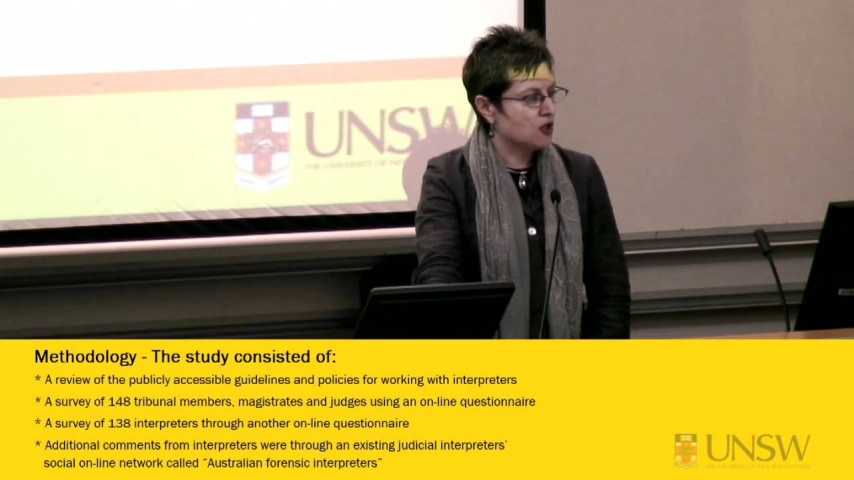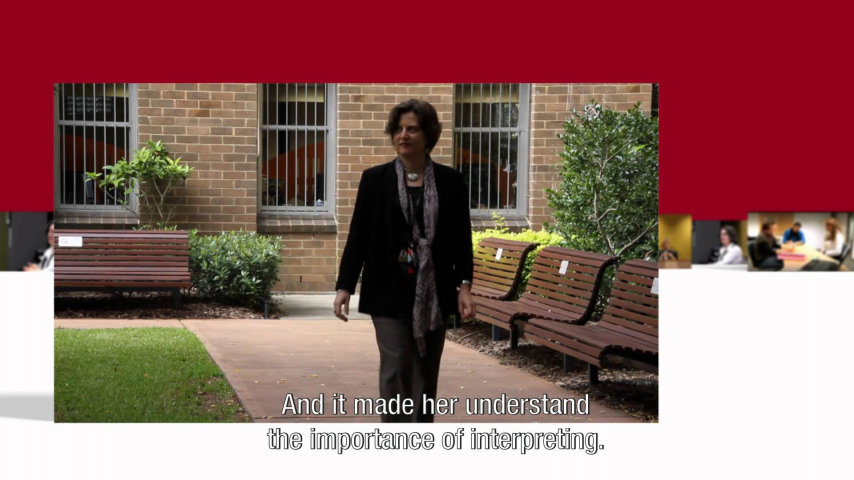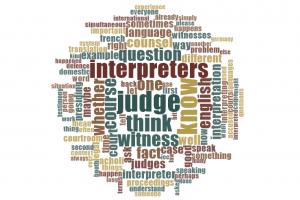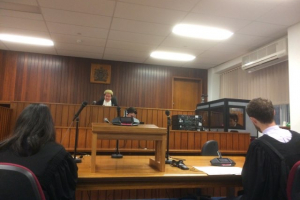
My Expertise
Community interpreting
Court interpreting
Legal interpreting
Keywords
Fields of Research (FoR)
Translation and interpretation studies, Discourse and pragmatics, Access to justice, Sociolinguistics, Language in Culture and Society (Sociolinguistics)SEO tags
Biography
Sandra graduated with the first PhD in forensic linguistics/court interpreting in Australia in 2001. Since then, her research has covered different aspects of legal interpreting, including issues of quality, accuracy, codes of ethics, role expectations, the impact of interpreters on legal proceedings, the perceptions of interpreters held by service providers and non-English speakers and the impact of working conditions on interpreter...view more
Sandra graduated with the first PhD in forensic linguistics/court interpreting in Australia in 2001. Since then, her research has covered different aspects of legal interpreting, including issues of quality, accuracy, codes of ethics, role expectations, the impact of interpreters on legal proceedings, the perceptions of interpreters held by service providers and non-English speakers and the impact of working conditions on interpreter performance.
As a pioneer in legal interpreting research, Sandra is one of the first in the world to conduct large data-based research of court interpreted proceedings, using a combination of innovative research methods that have been later adopted by other researchers. Her research has not only described current interpreting practices, but also tested their effect on judicial outcomes. Using authentic court transcripts, her early research micro-analysed the discoursal interaction between the law, the non-English speaking witnesses, and the interpreters, with particular attention to the impact of the interpreters’ renditions on the effect of strategic questions and on juror evaluations of witness testimony. Sandra is also among the few to have conducted experimental studies in the field. The results of her studies shed light on the meaning of accuracy in legal settings and have led to the development of a model of court interpreting accuracy, informed by Pragmatic theory, which is now widely used as a basis for interpreting training and as a theoretical model for PhD research.
Using a combination of experimental and discourse analytical methods, her most recent research has focused on different aspects of police and court interpreting, including the effect of interpreter education and background, language combination, interpreter mode and interpreter presence or remoteness on interpreter performance. Interpreters' maintenance of strategic investigative interview techniques, including rapport building, as well as their interpretation of vulgar and emotional language have also been key areas of investigation. Other research topics addressed by her research have included the impact of working conditions on interpreting accuracy.
All of Sandra’s research has practical applications for interpreting training and practice, as well as for policy on court interpreting. Sandra has actively disseminated the results of research not only among academics, but also among practising interpreters, legal practitioners and the judiciary, which has helped to raise awareness of interpreting issues and achieve better judicial outcomes. She has been invited to provide expert advice on interpreting for different jurisdictions and is cited in various judges' Bench books and state protocols for working with Interpreters. She was a principal author of the Recommended National Standards for Working with Interpreters in Courts and Tribunals, launched in 2017 by the Judicial Council on Cultural Diversity.
My Grants
- Remote simultaneous vs consecutive interpreting in investigative interviews: The effect of language and interpreter training on deception detection, interpreting accuracy and witness credibility (FBI grant)
- Access to justice in interpreted proceedings: The role of Judicial Officers (ARC Linkage grant)
- Interpreting justice: mode, accuracy and credibility (ARC Discovery grant)
- Interpreting mode: interpreter presence, and language in investigative interviews (FBI grant)
- Interpreters in court: witness credibility with interpreted testimony (ARC Linkage grant)
- Participation in the administration of justice: Deaf citizens as jurors (ARC Linkage grant)
- Communication Skills training for oncology health care professionals working with culturally and linguistically diverse patients (ARC Linkage grant)
- A phase II randomised controlled trial of consultation audiorecordings plus question prompt lists for people with cancer from Greek, Chinese or Arabic background (NHMRC grant)
My Qualifications
Bachelor of Arts (Interpreting & Translation), NAATI Spanish interpreter/translator & Conference interpreter, Diploma of Education (Italian & Spanish), Master of Applied Linguistics, PhD (Court interpreting/forensic linguistics), Doctorate Honoris Causa (Interpreting and Translation Studies)
My Awards
- 2018 Recipient of the inaugural Andrea Durbach Award for Human Rights Scholarship - with co-investigators Prof David Spencer, Ms Mehera San Roque, and Prof Jemina Napier - for their article: “Justice is blind as long as it isn’t deaf: excluding deaf people from jury duty - an Australian human rights breach”, published in the Australian Journal of Human Rights.
- 2016 Elected Fellow of the Australian Academy of the Humanities
- 2015 Recipient of the Dean’s Award for Programs that Enhance Learning, Faculty of Arts and Social Sciences, University of New South Wales
- 2015 Recipient of the Dean's Award for Research Society Impact, Faculty of Arts and Social Sciences, University of New South Wales
- 2015 Elected National AUSIT President
- 2014 Conferred Doctor Honoris Causa by the University of Antwerp
- 2013 Appointed Fellow of The Australian Institute of Interpreters & Translators (AUSIT)
- 2007 Awarded the UWS Vice-Chancellor’s Excellence award for University Engagement (Commended)
- 2007 NAATI recognition award
- 2001 Awarded the Macquarie University Vice-Chancellor’s Award and Dean’s Commendation for PhD thesis
My Research Supervision
Supervision keywords
Areas of supervision
Completed HDR and Honours supervisions:
2014-2020 Wan Kei Wong, A Mixed-Methods Study of Chinese-English Legal Interpreting in Australia and Interpreters' Use of Tools in Practice, PhD (joint supervision with Professor Ludmila Stern)
2014-2018 Han Xu, Interprofessional relations - Legal Aid lawyers and interpreters working together, PhD (joint supervision with Professor Ludmila Stern)
2013-2017 Xin Liu, Achieving accuracy in a bilingual courtroom: Pragmalinguistic challenges and the role of specialised legal interpreter training, PhD (joint supervision with Professor Ludmila Stern)
2013 Erika Gonzalez, Trained vs untrained interpreters in Community Interpreting, PhD (joint supervisor with Dr James Lee)
2013 Yongjun Mo, Interpreting and Translating Training: The Students' Voices, GradDip (Research & interpreting) (sole supervision)
2010 Cheng Zeng, The developmental patterns of dictionary use by Chinese students in translation into English, PhD (co-supervisor)
2010 Dahui Dong, An Application of Temporal Frame in Translating Chinese News into English, PhD (principal supervisor)
2010 Jeni Ryde, The reluctant museum, PhD (co-supervisor)
2010 Xin Jin, Listening Skills in the Second Language and Production in Consecutive Interpreting, PhD (co-supervisor)
2010 Silvia Martinez, Current practices in the Contracting of Legal Interpreters: A descriptive study, BA(Hons) (principal supervisor)
2009 Alejandra Hayes, A review of Australian judges' rulings on appeals on the grounds of incompetent interpreting, BA(Hons)
2008 Elizabeth Friedman, Medical practitioners working with interpreters, BA(Hons)
2008 Erika Gonzalez, International Endeavour Award (principal supervisor)
2005 Abbas Brashi, Arabic Collocations: Implications for Translation, PhD (co-supervisor)
2005 Na Quynh Pham Phu, Error analysis in Vietnamese-English Translation: Pedagogical Implications PhD (co-supervisor)
2002 Jaqueline McKechnie, Evaluating the effectiveness of coercive questions in controlling responses given by witnesses in Australian local court hearings, BA(Hons)
Currently supervising
PhD Candidate, Ran Yi - Interpreting courtroom questions (joint supervisor with Professor Ludmila Stern)
PhD Candidate, Sophia Ra - Intercultural communication challenges in interpreter-mediated healthcare encounters (joint supervisor with Professor Ludmila Stern)
My Engagement
AUSIT (The Australian Institute of Interpreters and Translators)
IAFL (The International Association of Forensic Linguists)
Multicultural NSW (MNSW) Advisory Board Member
Judicial Council on Cultural Diversity (JCCD) member of sub-committee on the Recommended National Standards for Working with Interpreters in Courts and Tribunals.
Sandra is the Immediate Past President of AUSIT as well as an AUSIT Fellow. She is also a Fellow of the Australian Academy of the Humanities. She is regularly invited to give presentations on Interpreting to judicial officers, tribunal members and lawyers. She has also led a number of important national consultancy projects, including the training of the 2000 Olympic language volunteers, the training of all the Community Relations Commission legal interpreters funded by the NSW Attorney General’s Department and the NAATI INT review. She's currently on the Advisory Board of Multicultural NSW and on the JCCD subcommittee on the Recommended National Standards for Working with Interpreters in Courts and Tribunals. Her books The discourse of court interpreting and Community Interpreting are widely used as text books nationally and internationally, with the latter one already translated into Spanish and Japanese. In 2014 she received an Honorary Doctorate from the University of Antwerp, Belgium, for her pioneering research in community interpreting.
My Teaching
Sandra has taught at undergraduate and graduate levels in the areas of Spanish language, legal discourse and research methods and continues to teach court interpreting, community interpreting, conference interpreting and interpreting theory. She's the Convenor of the Interpreting and Translation Programs in the School of Humanities and Languages, Faculty of Arts, Design and Architecture.
Contact
Publications
ORCID as entered in ROS
Research Activities
Videos







